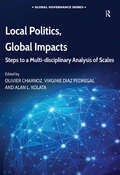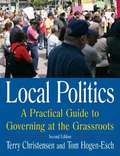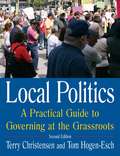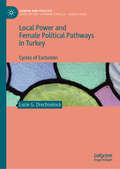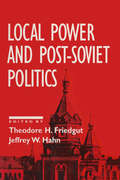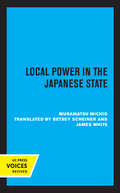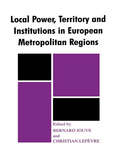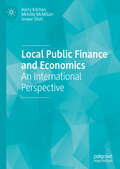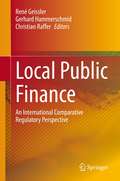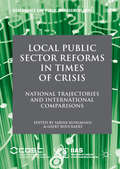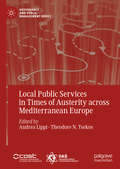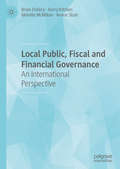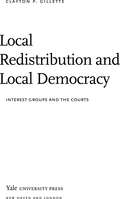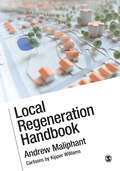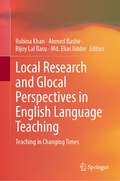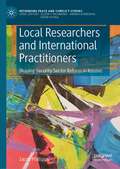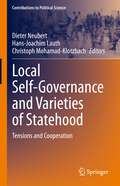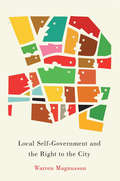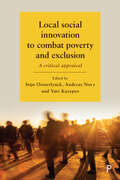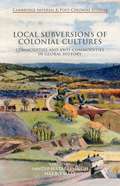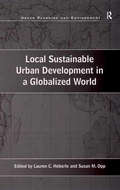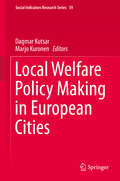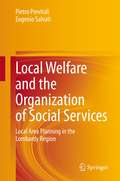- Table View
- List View
Local Politics, Global Impacts: Steps to a Multi-disciplinary Analysis of Scales (Global Governance)
by Olivier Charnoz Virginie Diaz PedregalServing as a touchstone for a much-needed research program on social scales, this volume challenges disciplinary boundaries and brings into focus a paradoxical state of affairs in contemporary thought: the domain of local-global interactions has not yet been identified as an object of analysis in its own right, despite engaging a large, multi-disciplinary research community with strong potential for cross-fertilization. Bringing together internationally renowned as well as emerging scholars, this book presents concrete case studies framed by theoretical concern with the issue of scale. It demonstrates that a diverse array of theoretical, methodological and empirical perspectives can productively converge on a common set of problems related to social, temporal and spatial scales and contemporary globalization. Local Politics, Global Impacts will stimulate empirical and theoretical research that focuses on understanding how political concepts, practices, and instruments translate across scales, and contribute to the emergence of a self-aware community of scholars and practitioners focusing explicitly on modelling the dynamics of local-regional-global interactions.
Local Politics: A Practical Guide To Governing At The Grassroots
by Terry Christensen Tom Hogen-EschUnlike most competing texts that are densely written and heavily theoretical, with little flavor of political life, this book is a readable, jargon-free introduction to real-life local politics for today's students. While it encompasses local government and politics in cities and towns across America, "Local Politics: A Practical Guide to Governing at the Grassroots" gives special attention to the politics of suburbia, where many students live, and encourages them to become engaged in their own communities. The book is also distinguished by its strong emphasis on nuts-and-bolts practical politics. It provides focused discussion of institutions, roles, and personalities as well as the dynamic environment of local politics (demographics, immigration, globalization, etc.) and major policy issues (budgets, land use, transportation, education, etc.). Other texts treat communities as abstractions and readers as passive observers. "Local Politics: A Practical Guide to Governing at the Grassroots" is designed to inspire civic engagement as well as understanding. It features "In Your Community" research projects for students in every chapter along with informative tables, clear charts, essential terms, and guides to useful websites.
Local Politics: A Practical Guide to Governing at the Grassroots
by Terry Christensen Tom Hogen-EschUnlike most competing texts that are densely written and heavily theoretical, with little flavor of political life, this book is a readable, jargon-free introduction to real-life local politics for today's students. While it encompasses local government and politics in cities and towns across America, "Local Politics: A Practical Guide to Governing at the Grassroots" gives special attention to the politics of suburbia, where many students live, and encourages them to become engaged in their own communities. The book is also distinguished by its strong emphasis on nuts-and-bolts practical politics. It provides focused discussion of institutions, roles, and personalities as well as the dynamic environment of local politics (demographics, immigration, globalization, etc.) and major policy issues (budgets, land use, transportation, education, etc.). Other texts treat communities as abstractions and readers as passive observers. "Local Politics: A Practical Guide to Governing at the Grassroots" is designed to inspire civic engagement as well as understanding. It features "In Your Community" research projects for students in every chapter along with informative tables, clear charts, essential terms, and guides to useful websites.
Local Power and Female Political Pathways in Turkey: Cycles of Exclusion (Gender and Politics)
by Lucie G. DrechselováThis book explores the “Turkish paradox” – women’s lower representation in local politics than in parliament. By analyzing life stories of 200 female municipal councilors and party representatives, it offers a comprehensive assessment of what makes local politics in Turkey particularly inaccessible to women. It places women’s pathways within the cycles of exclusion, starting by political socialization, going through the candidate recruitment process and continuing after the election. The research presented here brings together gender studies and political sociology and offers novel applications of concepts including intersectionality and biographical availability. It covers all major political parties and diverse local configurations in Turkey, and reveals political strategies of women in conservative parties as well as the reasons behind the exceptionally high representation of women within the pro-Kurdish political parties. The book further sheds some light on the intricate relationship between women’s political activity and regime change in the context of democratic backsliding.
Local Power and Post-Soviet Politics (Contemporary Soviet - Post-soviet Politics Ser.)
by Jeffrey W. Hahn Theodore H. FriedgutAn analysis of local legislative and budgetary politics during the late Soviet and post-Soviet period with case studies of electoral behaviour, distribution processes, political contestation, and institutional development.
Local Power in the Japanese State
by Michio MuramatsuThis title is part of UC Press's Voices Revived program, which commemorates University of California Press’s mission to seek out and cultivate the brightest minds and give them voice, reach, and impact. Drawing on a backlist dating to 1893, Voices Revived makes high-quality, peer-reviewed scholarship accessible once again using print-on-demand technology. This title was originally published in 1997.
Local Power, Territory and Institutions in European Metropolitan Regions: In Search of Urban Gargantuas (Routledge Studies in Federalism and Decentralization #No. 6)
by Bernard Jouve Christian LefèvreA comparative analysis of eight different urban areas - Bologna, Bordeaux, Geneve-Lausanne, Lyons, Manchester, Rotterdam, Stuttgart and Torino - examining key urban issues that are high on the policy agenda of every national government.
Local Public Finance and Economics: An International Perspective
by Anwar Shah Harry Kitchen Melville McMillanGlobalization and the information revolution have highlighted the catalytic role of local governments for improving economic and social outcomes at the local level as well as growing the national economy by enhancing international competitiveness. This comprehensive account of local public finance and economics brings together principles and better practices for improving quality and access of local public services provision. The volume covers assignment of responsibilities; jurisdictional design; local service delivery; local regulation; local self-financing options such as income, sales, property and environmental taxation, user charges and fees; infrastructure finance options; and higher order government financing of local governments. The treatment is non-technical and suitable for a wide variety of audiences including scholars, instructors, students, media, policy advisers and practitioners.
Local Public Finance: An International Comparative Regulatory Perspective
by René Geissler Gerhard Hammerschmid Christian RafferThis book is based upon a comparative public administration research project, initiated by the Hertie School of Governance (Germany) and the Bertelsmann Foundation (Germany) and supported by a network of researchers from many EU countries. It analyzes both the regimes and the practices of local fiscal regulation in 21 European countries. The book brings together key findings of this research project. The regulatory discussion is not limited to the prominent issue of fiscal rules but focuses on every component of regulation. Beyond this, the book covers affiliated topics such as the impact of regulation for local governments, evolution of regulation, administrative costs and crisis prevention. The various book chapters throughout provide a broad picture of local public finance regulation in theory and in practice, using different theoretical and national lenses for the analysis. Furthermore, the authors investigate the effects of budgetary constraints and higher-level regulatory efforts on local governments and on democracy and public services in every European country. This book fills a gap with respect to the lack of discussion on local government finance from an international, comparative perspective and, in particular, the regulation of local public finance. With its mix of authors, this book will be useful for practitioners as well as for scholars and for theory-driven research.
Local Public Sector Reforms in Times of Crisis
by Sabine Kuhlmann Geert BouckaertThis book compares the trajectories and effects of localpublic sector reform in Europe and fills a research gap that hasexisted so far in comparative public administration and local governmentstudies. Based on the results of COST research entitled, 'Local Public SectorReforms: an International Comparison', this volume takes a European-scale approach,examining local government in 28 countries. Local government has been the mostseriously affected by the continuously expanding global financial crisis andausterity policies in some countries, and is experiencing a period of increasedreform activity as a result. This book considers both those local governmentswhich have adopted or moved away from New Public Management (NPM) modernizationto 'something different' (what some commentators have labelled 'post-NPM'), aswell as those which have implemented 'other-than-NPM measures', such asterritorial reforms and democratic innovations.
Local Public Services in Times of Austerity across Mediterranean Europe (Governance and Public Management)
by Andrea Lippi Theodore N. TsekosThis book provides a comparative analysis of the processes and impacts of austerity measures introduced in the field of Local Public Services (LPS) across Mediterranean Europe. The book describes and compares the trajectories of austerity, and the types of effects. It investigates how many (and what kind of) different responses were given to similar inputs and under the influence of what factors in order to understand if there are regularities in the way that the Mediterranean countries adopted and implemented the austerity measures and how these latter impacted on local government and LPS management and delivery. The book is a product of a sub network from the COST Action LocRef IS1207 and analyses seven countries (Portugal, Spain, Italy, Greece, Croatia, Cyprus and Albania).
Local Public, Fiscal and Financial Governance: An International Perspective
by Anwar Shah Harry Kitchen Melville McMillan Brian DolleryThis book provides a comprehensive treatment of traditional as well as newer topics in local public, fiscal and financial management principles and practices. It covers traditional topics of local public management, local revenue administration with special emphasis on property tax administration, local budgeting and accounting, and methods of capital finance. Newer topics covered include political economy of local government, fiscal rules for local fiscal discipline, local government integrity and performance accountability, and municipal mergers and inter-municipal cooperation based upon relative importance and political, fiscal and administrative autonomy of local governments. The treatment is non-technical and suitable for a wide variety of audiences including scholars, instructors, students, policy advisors, and practitioners.
Local Redistribution and Local Democracy
by Clayton P. GilletteThe traditional theory of urban finance argues against local redistribution of wealth on the assumption that such action is likely to chase away the relatively wealthy, leaving only the impoverished behind. Nevertheless, Clayton P. Gillette observes, local governments engage in substantial redistribution, both to the wealthy and to the poor. In this thoughtful book, Gillette examines whether recent campaigns to enact "living wage" ordinances and other local redistributive programs represent gaps in the traditional theory or political opportunism. He then investigates the role of the courts in distinguishing between these explanations. The author argues that courts have greater capacity to review local programs than is typically assumed. He concludes that when a single interest group dominates the political process, judicial intervention to determine a program's legal validity may be appropriate. But if the political contest involves competing groups, courts should defer to local political judgments.
Local Regeneration Handbook
by Andrew MaliphantLocal regeneration, and action on local issues, is fundamental to the sustainability of local communities. This is especially the case in the UK, with the Government focus on such approaches as Local Enterprise Partnerships and neighbourhood development plans, and further devolution proposals in the pipeline. The Local Regeneration Handbook meets the needs of today′s practising "regeneration workers", broadly including anyone from regeneration partnership or development project officers to housing association neighbourhood officers, parish councillors, or other active local citizens, who all share a concern for the wellbeing of the community where they live or work, and a need to work with others for the best possible future for that community. Containing practical advice, templates, and real-life case studies for different stages in local regeneration, including fundraising, partnership development and project management, as well as support for personal development, and illustrations of key points by cartoonist Kipper Williams, this is an essential guide for anyone in local regeneration.
Local Research and Glocal Perspectives in English Language Teaching: Teaching in Changing Times
by Rubina Khan Ahmed Bashir Bijoy Lal Basu Md. Elias UddinThis book provides an overview of recent trends and developments in the field of English language education. It showcases research endeavors from a heterogenous group of scholars from different parts of the world and brings together perspectives from both experienced and emerging scholars. This book provides a platform for established as well as emerging practitioners and scholars in the field of English Language Teaching to share their research. It synthesizes local expertise and culture with innovative ideas from other contexts and brings theory and practice together in one volume.
Local Researchers and International Practitioners: Shaping Security Sector Reform in Kosovo (Rethinking Peace and Conflict Studies)
by Jacob PhillippsThis book is driven by the question: what role is played by the local security research community in Kosovo’s internationally-led Security Sector Reform? Kosovo’s SSR has been heavily driven by international knowledge rather than the context-sensitive evidence, with negative implications for the legitimacy and sustainability of SSR. Centred on an analysis of an extensive interview survey of international SSR practitioners and local researchers in Kosovo and local research papers, this book highlights how local research has engaged with, challenged and contributed to international SSR. Despite the general experience of local marginalisation, local researchers have an important role to play. Following engagement with local research, international SSR practitioners may consider local context in greater depth and think more critically about SSR implications. This highlights the potentially key role that local researchers can play to support effective post-conflict recovery.
Local Self-Governance and Varieties of Statehood: Tensions and Cooperation (Contributions to Political Science)
by Hans-Joachim Lauth Dieter Neubert Christoph Mohamad-KlotzbachThe debate on governance originates in the OECD world. At the latest since the postcolonial debate, we know that we need to “test” our assumptions under radically different conditions. This book offers an extended perspective of local self-governance by examining cases from South Asia, Africa, and Latin America, together with a study of militias in the USA. The chapters present a wide variety of local actors who pursue different notions of order legitimized by local traditions based on hierarchy or deeply rooted communalism, Islamic theology, or grassroots democracy. Some local actors claim a state-like authority and challenge the territorial state. In such cases, there is no longer “a shadow hierarchy” but opposition to the state. Different violent actors fight for supremacy, and the state is just one actor among others. The empirical studies presented in this book show how different kinds of local self-governance are combined with varieties of statehood, and thus contribute to an understanding of the notion of governance in a fundamental sense that goes beyond the special case of the OECD world.
Local Self-Government and the Right of the City
by Warren MagnussonDespite decades of talk about globalization, democracy still depends on local self-government. In Local Self-Government and the Right to the City, Warren Magnusson argues that it is the principle behind claims to personal autonomy, community control, and national self-determination, and holds the promise of more peaceful politics. Unfortunately, state-centred thinking has obscured understanding of what local self-government can mean and hindered efforts to make good on what activists have called the "right to the city. " In this collection of essays, Magnusson reflects on his own efforts to make sense of what local self-government can actually mean, using the old ideal of the town meeting as a touchstone. Why cannot communities govern themselves? Why fear direct democracy? As he suggests, putting more trust in the proliferating practices of government and self-government will actually make cities work better, and enable us to see how to localize democracy appropriately. He shows that doing so will require citizens and governments to come to terms with the multiplicity, indeterminacy, and uncertainty implicit in politics and steer clear of sovereign solutions. The culmination of a life’s work by Canada’s leading political theorist in the field, Local Self-Government and the Right to the City ranges across topics such as local government, social movements, constitutional law, urban political economy, and democratic theory.
Local Self-Government and the Right to the City (McGill-Queen's Studies in Urban Governance #1)
by Warren MagnussonDespite decades of talk about globalization, democracy still depends on local self-government. In Local Self-Government and the Right to the City, Warren Magnusson argues that it is the principle behind claims to personal autonomy, community control, and national self-determination, and holds the promise of more peaceful politics. Unfortunately, state-centred thinking has obscured understanding of what local self-government can mean and hindered efforts to make good on what activists have called the "right to the city." In this collection of essays, Magnusson reflects on his own efforts to make sense of what local self-government can actually mean, using the old ideal of the town meeting as a touchstone. Why cannot communities govern themselves? Why fear direct democracy? As he suggests, putting more trust in the proliferating practices of government and self-government will actually make cities work better, and enable us to see how to localize democracy appropriately. He shows that doing so will require citizens and governments to come to terms with the multiplicity, indeterminacy, and uncertainty implicit in politics and steer clear of sovereign solutions. The culmination of a life’s work by Canada’s leading political theorist in the field, Local Self-Government and the Right to the City ranges across topics such as local government, social movements, constitutional law, urban political economy, and democratic theory.
Local Social Innovation to Combat Poverty and Exclusion: A Critical Appraisal
by Stijn Oosterlynck, Andreas Novy & Yuri KazepovBased on more than thirty case studies in eight different countries, this book explores the governance dynamics of local social innovations in the field of poverty reduction. The diverse team of contributors reflect on the trajectory of social innovation in European governance. They illustrate how different governance dynamics and welfare mixes enable or hinder poverty reduction strategies and analyse how they involve a diversity of actors, instruments and resources at different spatial scales. The contributions are based on research motivated by the standstill in the fight against poverty in Europe and the anxiety that conventional macro-social policies are insufficient to deal with the current challenges.
Local Subversions of Colonial Cultures: Commodities and Anti-Commodities in Global History (Cambridge Imperial and Post-Colonial Studies Series)
by Sandip Hazareesingh Harro MaatThe book brings together original, state-of-the-art historical research from several continents and examines how mainly local peasant societies responded to colonial pressures to produce a range of different commodities. It offers new directions in the study of African, Asian, Caribbean, and Latin American societies.
Local Sustainable Urban Development in a Globalized World
by Susan M. Opp'Sustainable development' is a key issue of concern to urban planners across the globe. How it is defined, implemented and measured at the local level remains highly contested and subject to a wide range of external cultural, political and economic pressures. Bringing together leading experts from North America, Europe, the Middle East and SE Asia, this book provides a timely overview of the various methods for understanding and implementing sustainable practices at local levels. In doing so, they present the wide range of local action alternatives available to planners that may be pursued in spite of the constraints generated by globalization processes and highlight the array of public policy options that could reduce the external pressures shaping the possible local alternatives. The book argues that, while local planners and local authorities are willing to act, many are unaware of the range of options available to them. In bringing together these case studies, not only diverse in geographic terms, but also reflecting very different levels of income, general population education, cultural norms, legal systems and government structures, it points out innovations and examples of best practice.
Local Tax Benefits at a Distance: Japan's Hometown Tax Donation Payment (SpringerBriefs in Economics)
by Takaaki Hoda Richard B. DasherThis book discusses the concepts, types, models, and patterns of Japan’s Hometown Tax Donation Payment system, to provide a clear picture of this newly developed unique and innovative fund-raising tool used by municipalities. It also sheds light on the influences that reciprocal gifts provided by each municipality to donors have on local economies by reviewing empirical works and surveys targeting local business owners and local financial institutions. A distinguishing feature of the book is that it introduces a new social finance mechanism that is unique to the Japanese market and could provide policy implications for small and medium-sized enterprises (SMEs) as well as regional development. Furthermore, the book explores the efficacy of the demand–pull approach to support-strengthening SMEs, especially in rural areas. Finally, the book identifies some lessons learned from the system with a view toward advancing research on this phenomenon and making the system efficient and sustainable. As a whole, the book can provide ample benefits to novices, academics, researchers, and policymakers interested in Hometown Tax Donation Payment, an innovative social finance tool.This is an open access book.
Local Welfare Policy Making in European Cities
by Dagmar Kutsar Marjo KuronenThis book focuses on how EU welfare policies are implemented at the local level in 11 European cities and how local policy making addresses women's care responsibilities. The book studies the complex combination of and the relationships between local political processes, policies, institutions, structural conditions and outputs, as well as outcomes for the women's labour market integration. It demonstrates how cultural settings and multi-level governance patterns form the "playground" for local policy makers to formulate their welfare policies concerning service provision. The book further demonstrates how local production systems and the situation of the local labour market influence the prospects that women have in working and caring. EU welfare policy promotes the labour market integration of women as well as gender equality. The provision of adequate care services is vital in supporting women's employment. Within comparative welfare research, the focus has been on the national welfare systems and policies even if care services are overwhelmingly provided by local authorities that in many EU member states enjoy considerable autonomy. This book fills the gap in understanding local welfare policy making from a comparative perspective.
Local Welfare and the Organization of Social Services: Local Area Planning in the Lombardy Region
by Pietro Previtali Eugenio SalvatiThis book discusses local area planning in the Lombardy region of Italy. The book provides valuable insights about the development of local welfare systems and the territorial organization of social services through the analysis of the evolution of the Local Area Plan, which lies at the intersection of sub regional governance and of social services delivery models. Using Lombardy as a case study, this brief analyzes the structural conditions influencing the establishment of Local Area Plans, their effect on inter-municipal cooperation, and the need for possible reforms. The book is organized as follows: the first chapter presents a reconstruction of the national and regional framework, analyzing the structure of ties and opportunities within which Local Area Plans are called to act. The second chapter provides a review of the extant literature on Local Area Plans and introduces the theoretical framework used by the volume. The third chapter details legislation introduced in Lombardy to reform the governance structure of Local Area Plans by supporting a process of reorganization and aggregation. The fourth chapter presents some cases of Local Area Plan aggregation. The final chapter presents the conclusion and some brief considerations about the future of social planning. Providing an empirical analysis of local service delivery, this book will be useful to scholars and practitioners interested in public administration, welfare, local government, non-profit and public organizations, and management.
